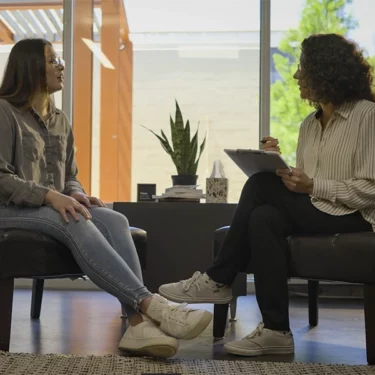There are fewer things more amazing than effecting positive change. Just ask Linda Henderson-Smith, PhD, LPC, director of children and trauma-informed services for the National Council. With almost 20 years of clinical and administrative experience in community-based mental health, Linda brings unmatched knowledge and perspective to the organization. I recently sat down with Linda to learn more about her journey, consulting style and passion for helping clients become trauma-informed.
NICHOLAS THOMAS: What was your path to the National Council like?
LINDA HENDERSON-SMITH: I’ve spent my career focused on children, young adults and families (CYF), ensuring they have what they need when they need it, in the amount that they need it and in culturally sensitive ways. I started out as a frontline clinician doing home- and community-based services, went on to work for the government – where I was responsible for policy, practice and the evaluation of all home- and community-based services for CYF in Washington, D.C. – and then moved to Georgia to run a federal grant to increase home- and community-based services for those most in need.
I eventually became the director of the office of children, young adults and families for Georgia, where I was responsible for everything from prevention to in-patient care, including crisis and mobile crisis services. From there, I moved on to provide technical assistance at the national level around behavioral health planning and policy for other states. My purpose has always been about ensuring the most marginalized CYF get the care they need when they need it. So, when I read the National Council’s mission and vision, and I saw how they do what they do, it aligned with my purpose … the connection was made.
NT: What can you tell us about trauma-informed care?
LHS: Trauma-informed care – or TIC – is an organizational and community change framework, one in which we look at all of the processes, procedures and interventions in place. TIC is about enhancing the patient experience, improving population health, reducing costs and boosting the work life of staff. We do that by looking through a lens of cultural humility; diversity, equity and engagement; safety; creating trust and transparency; empowering people to have a voice; providing peer support, and more.
NT: How would you summarize the services you provide as a consultant?
LHS: In my role, I provide training, consultation, facilitation and support to individual organizations and communities around children’s behavioral health, crisis behavioral health, equity and trauma-informed, resilience-oriented care. I’ve worked with federally qualified health centers, as well as in the public health, child welfare, juvenile justice, hospital and bank sectors.
NT: How would you describe your consulting style?
LHS: I’m a participatory leader, which means I’m a participatory consultant. I want to hear your story and show you how to become more administratively efficient. I help people with their own personal and professional growth, and I support organizations throughout their development process. I also help leaders strengthen their skills when leading their organizations. My job is to help create a sustainable infrastructure to support whatever change you’re working toward or will come in the future.
NT: What do you love most about being a consultant?
LHS: I love watching the change process! Especially those ‘a-ha’ moments that occur when the investment is made. I was in an equity community of practice meeting yesterday, and I was talking about the importance of creating safe spaces for individuals. We had an honest conversation about choosing to opt out of hard conversations. It was a great discussion, and I got to see the moment when things clicked for them; how sitting in discomfort was a growth opportunity and watching them come to that realization.
NT: Speaking of enjoyment, what do you like to do outside of work?
LHS: Music is my passion! I have a favorite artist in all genres. Right now, I’m listening to Tasha Cobbs Leonard, one of my favorite gospel artists. She speaks to my soul and seems to understand what I’ve been through and what I think. She provides a healing experience.
Guest Author
Director of Content Marketing
National Council for Mental Wellbeing



